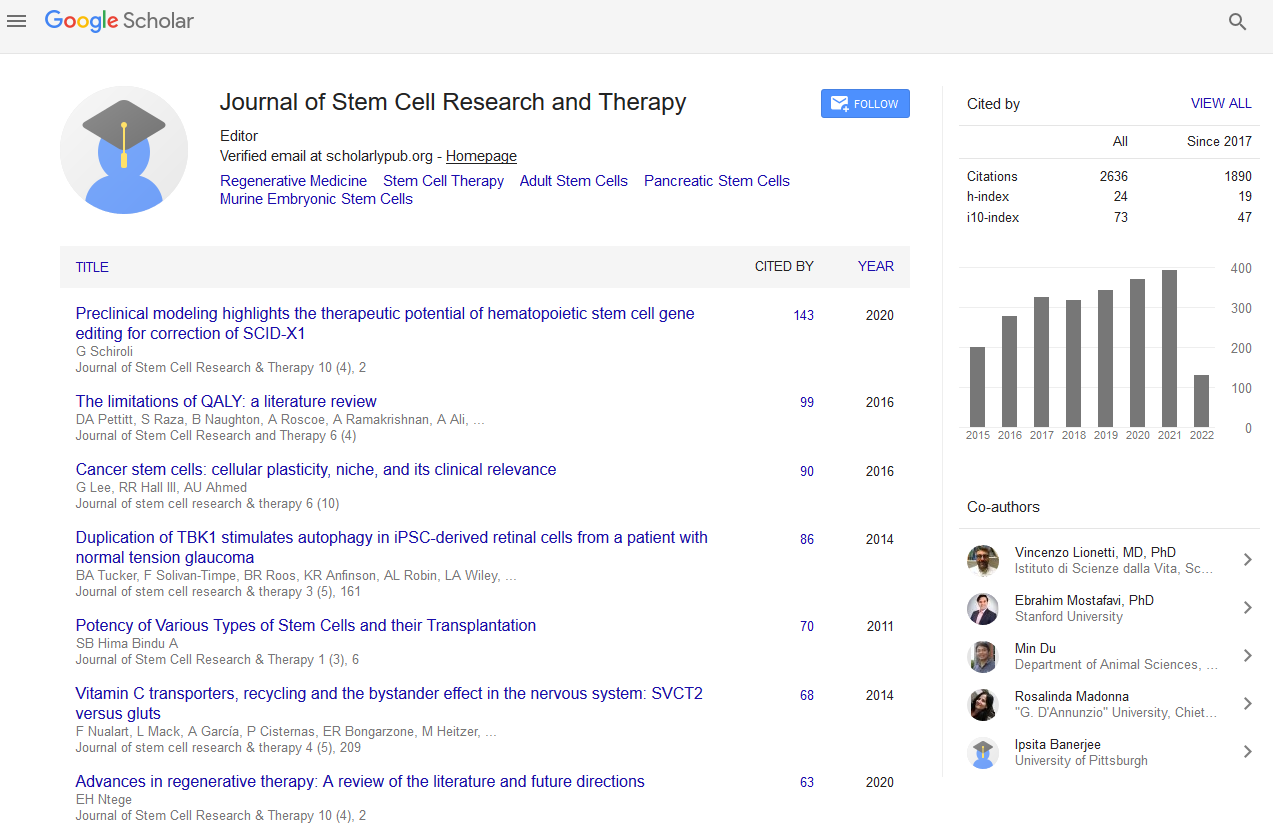Indexed In
- Open J Gate
- Genamics JournalSeek
- Academic Keys
- JournalTOCs
- China National Knowledge Infrastructure (CNKI)
- Ulrich's Periodicals Directory
- RefSeek
- Hamdard University
- EBSCO A-Z
- Directory of Abstract Indexing for Journals
- OCLC- WorldCat
- Publons
- Geneva Foundation for Medical Education and Research
- Euro Pub
- Google Scholar
Useful Links
Share This Page
Journal Flyer

Open Access Journals
- Agri and Aquaculture
- Biochemistry
- Bioinformatics & Systems Biology
- Business & Management
- Chemistry
- Clinical Sciences
- Engineering
- Food & Nutrition
- General Science
- Genetics & Molecular Biology
- Immunology & Microbiology
- Medical Sciences
- Neuroscience & Psychology
- Nursing & Health Care
- Pharmaceutical Sciences
Hematopoietic stem cell-based therapy for HIV disease: â??Berlinâ?? versus â??Essenâ?? patients
4th International Conference and Exhibition on Cell & Gene Therapy
August 10-12, 2015 London, UK
Josef Bodor1,2, Petr Kobylka1, Radek Klubal3, Karola Schaefer4 and Jan van Lunzen4
Posters-Accepted Abstracts: J Stem Cell Res Ther
Abstract:
The goal of our work is to develop insight and understanding of the effect of deleting the chemokine receptor CCR5 in T cells,
and its interplay with immune regulation of human immunodeficiency virus type – 1 (HIV-1), to enable a novel technology
platform to cure HIV disease. A critical point is the use hematopoietic stem cell (HSC) transplantation of the cells resistant to
HIV such as CCR5Δ32 cells, which harbor deletion in the CCR5 promoter. Such mutation confer resistance to CCR5-tropic
HIV-1 in homozygous individuals and could cure HIV-1 disease based on the outcome of bone marrow engraftment in HIV+
leukemic patients using a CCR5Δ32 homozygous donor (‘Berlin Patient’). However, a shift of HIV tropism to CXCR-4 tropic
strains of HIV-1 might be limiting after HSC transplantation with CCR5Δ32/Δ32 mutation since it could lead to recurrence of
viremia (‘Essen patient’). In addition, patients receiving allogeneic bone marrow transplantation often suffer from graft- versushost
disease (GvHD), and for that reason HIV infection is not considered an indication, unless a hematologic malignancy warrants
transplantation. To advance this field, it is, however, vital to search for novel determinants to HIV susceptibility using genomewide
analyses and exploit mechanisms, which play a crucial role in repression of CD4+ T conventional cells (Tcons) by naturally
occurring CD4+CD25+ T regulatory cells (nTregs). In order to ameliorate GvHD, further understanding of the mechanisms
of immunological self-tolerance will also provide insights into how strong immune responses such as graft rejection could be
restrained and engraftment of HIV resistant cells in HIV+ leukemic patients could be augmented.
Biography :
Josef Bodor received his PhD (1990) with honors from Institute of Molecular Genetics in Prague, Czech Republic. As of 2013, he is a Senior Investigator working at the Institute
of Experimental Medicine in Prague, Czech Republic. He is a Senior Scientist with faculty experience from Ivy League Institutions in US hosting on sabbatical leaves around
the world (Harvard University Boston, MA, Columbia University; New York, NY, Kyoto University, Kyoto, Japan, Würzburg University, Würzburg, Germany, and Johannes
Gutenberg University in Mainz, Germany). He as an Associate Member of Transregio 52 published series of original reports summarized in authoritative reviews.


